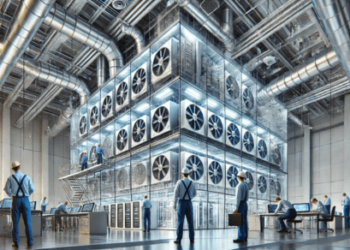Marine engines are the powerhouses behind every boat or yacht, providing the necessary propulsion to navigate through water. These machines come in various sizes and types, depending on the type of vessel they are meant for. From small outboard motors to large diesel engines, marine engines play a crucial role in ensuring a smooth and safe journey on the water. In this article, we will explore the different types of marine engines and their functions, as well as some important maintenance tips to keep them running smoothly for years to come.
What are Marine Engines?
Marine engines, also known as boat engines or ship engines, are internal combustion engines specifically designed to work in a marine environment. They use fuel to create energy that powers the vessel and its components. Unlike land-based vehicles, marine engines require additional measures to protect them from water damage and corrosion due to constant exposure to saltwater. This means they need regular maintenance and proper care to perform at their best.
Types of Marine Engines
There are three main types of marine engines: outboard motors, inboard motors, and sterndrive motors. Each has different features and is suitable for a specific type of boat or yacht.
Outboard Motors
Outboard motors are the most common type of marine engines and are usually found on smaller boats, such as fishing boats and dinghies. They are mounted on the transom (back) of the boat and can be easily removed for storage or maintenance. Outboard motors have their own fuel tank and steering mechanism, making them self-contained and easy to maneuver.
Inboard Motors
Inboard motors are typically used in larger boats or yachts and are installed within the hull of the vessel. They require a separate fuel tank and need to be accessed from inside the boat for maintenance. Inboard motors provide more power than outboard motors, making them ideal for bigger vessels that need to travel longer distances.
Sterndrive Motors
Sterndrive motors, also known as inboard/outboard motors, combine the features of both outboard and inboard motors. They are mounted on the back of the boat like an outboard motor but have their engine inside the hull like an inboard motor. Sterndrive motors offer good maneuverability and fuel efficiency, making them a popular choice for mid-size boats.
Each type has its advantages and disadvantages, depending on factors such as size, speed, fuel efficiency, and water conditions. For example, outboard motors are easier to maintain and maneuver, making them ideal for smaller boats and shallow waters. In contrast, inboard motors have a lower center of gravity, providing better stability in rough seas.
Best Selling Marine Engines
Some of the best-selling marine engines in the market today include Yamaha, Mercury, Suzuki, and Volvo Penta. These companies offer a variety of models with different horsepower options to suit various boat sizes and types. When choosing a marine engine, it is important to consider factors such as fuel efficiency, reliability, and warranty coverage.
- Volvo Penta: With over 100 years of experience, Volvo Penta is a well-known brand in the marine industry. Their engines are known for their fuel efficiency and advanced technology, making them a popular choice among boat owners.
- Mercury Marine: Mercury Marine has been manufacturing marine engines for over 80 years and offers a wide range of options from small outboard motors to high-performance engines. They are also known for their innovative features such as joystick controls and digital throttle/shift systems.
- Yamaha: Yamaha is another top brand in the marine engine market, offering reliable and durable engines with excellent fuel efficiency. They also have a strong focus on environmental sustainability, with many of their models meeting strict emissions standards.
- Suzuki: Known for their high-quality engines and quiet operation, Suzuki is a popular choice for both recreational and commercial boats. Their models also have advanced fuel injection technology, resulting in better performance and fuel efficiency.
- MAN: For larger vessels, MAN is a trusted brand for marine engines with high horsepower options. They are known for their durability and long-lasting performance, making them a top choice for commercial boats and yachts.
- Caterpillar: Caterpillar is another well-known name in the marine engine industry, offering powerful engines with advanced technology and fuel efficiency. They also have a global support network, providing customers with reliable service wherever they are.
- Cummins: Cummins is a leading manufacturer of marine engines, with options for both recreational and commercial boats. Their engines are known for their durability, fuel efficiency, and low emissions, making them a popular choice among boaters.
- Yanmar: Yanmar is a Japanese company that specializes in small, compact marine engines for sailboats and smaller powerboats. Their engines are known for their reliability and low fuel consumption, making them a popular choice for long-distance sailing.
- GM Detroit Diesel Engines: GM Detroit Diesel Engines are a popular choice for larger boats and yachts, known for their powerful performance and durability. They offer a wide range of horsepower options to suit different vessel sizes and types.
If you need a brand new marine engine for your new or currently used boat or yacht, then you need to get in touch with Fenquin Pty Ltd immediately. They sell all the best known marine engines, outboards, inboards, sterndrives, as well as their spare parts and accessories, and they also offer repair and maintenance services.
Functions of Marine Engines
The primary function of marine engines is to convert fuel into mechanical energy that propels the boat forward. However, depending on the type of engine, they may also serve other purposes such as generating electricity for onboard systems or controlling steering and navigation. For larger vessels, multiple engines may be used to provide enough power for propulsion and auxiliary functions.
Maintaining Your Marine Engine
Proper maintenance is crucial for keeping your marine engine in top condition. Regularly check and change the oil and filters according to the manufacturer’s recommendations. Keep an eye on the cooling system and make sure it is free from debris or any leaks. Also, inspect the propeller regularly for any damage that may affect its performance.
In addition to regular maintenance, it is important to follow safe practices while operating your marine engine. Avoid overloading the boat with too many passengers or gear, as this can put strain on the engine and affect its performance. Use high-quality fuel and additives specifically designed for marine engines to prevent corrosion and buildup.
Maintenance Tips
Proper maintenance is crucial for the longevity and performance of marine engines. Here are some tips to keep in mind:
- Regularly check and change the engine oil and other fluids, as well as filters.
- Ensure proper ventilation to prevent buildup of harmful fumes.
- Keep the engine clean and free from debris or corrosion.
- Check for any signs of wear or damage and replace parts as needed.
- Follow manufacturer guidelines for winterization and storage to avoid any damage during off-season periods.
By following these maintenance tips, you can ensure that your marine engine continues to run smoothly and efficiently for many years. In addition, it is important to always follow safety protocols when operating a boat with a marine engine. This includes wearing life jackets, maintaining safe speeds, and avoiding alcohol consumption while boating.
Marine engines are essential components of any boat or yacht, providing the power necessary for a safe and enjoyable journey on the water. By understanding the different types and functions of these engines, as well as properly maintaining them, you can ensure a smooth sailing experience every time.
















